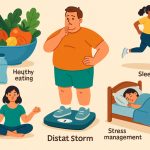Hormones are chemical messengers that travel through the bloodstream and regulate many functions in the body—including mood, energy, sleep, and emotions. Though we can’t see or feel them directly, their effects are profound. When hormones are in balance, we tend to feel well. But even small hormonal shifts can influence how we feel emotionally and mentally.
What Are Hormones?
Hormones are produced by endocrine glands and act like messengers between organs and tissues. Key glands include the pituitary, thyroid, adrenal glands, and reproductive organs (ovaries or testes).
Hormones help regulate:
- Metabolism
- Growth and development
- Reproductive cycles
- Sleep and alertness
- Emotional responses
Mood is especially sensitive to changes in hormone levels.
Hormones That Influence Mood
Several specific hormones play a direct role in how we feel:
- Serotonin: Often called the “happiness hormone,” it promotes well-being and calm. Low serotonin levels are linked to depression.
- Cortisol: The “stress hormone” helps you respond to danger but can cause anxiety or irritability when levels remain high.
- Estrogen: This female hormone influences serotonin and mood. Its fluctuation during the menstrual cycle, pregnancy, or menopause can affect emotions.
- Progesterone: A calming hormone, it can drop sharply before menstruation, leading to mood swings or premenstrual syndrome (PMS).
- Testosterone: Although known for muscle and energy, it also affects motivation, confidence, and emotional stability in both men and women.
- Oxytocin: The “love hormone,” released during bonding moments, boosts feelings of trust and connection.
- Melatonin: Regulates sleep. Poor sleep from low melatonin can worsen mood and increase stress.
Life Stages and Hormonal Mood Changes
Throughout life, natural hormonal shifts can lead to emotional changes:
- Puberty: Hormonal surges may cause irritability, sadness, or moodiness in teens.
- Menstrual cycle: Many people experience mood swings related to hormone fluctuations.
- Pregnancy and postpartum: Estrogen and progesterone change drastically, influencing mood and sometimes causing postpartum depression.
- Menopause: Hormonal decline can bring irritability, anxiety, or low mood.
- Aging: Reduced hormone levels in older adults may contribute to mood changes or fatigue.
These stages are normal, but support and awareness are important.
How to Support Hormonal Balance Naturally
While some mood changes are unavoidable, you can help regulate your hormones with lifestyle habits:
- Regular exercise: Boosts serotonin and endorphins
- Healthy diet: Foods rich in fiber, omega-3s, and vitamins support hormone production
- Adequate sleep: Rest allows hormones like melatonin and cortisol to reset
- Stress management: Meditation, walking, and deep breathing lower cortisol
- Social connection: Positive relationships increase oxytocin and serotonin
- Avoid excess sugar and alcohol, which disrupt hormone balance
If mood changes are persistent or severe, consult a specialist—self-diagnosis is not recommended.
Glossary
- Endocrine glands – Organs that produce and release hormones into the blood
- Serotonin – A chemical that promotes calm and happiness
- Cortisol – A hormone released in response to stress
- Oxytocin – A hormone that supports emotional bonding and social behavior
- Melatonin – A hormone that regulates sleep-wake cycles


